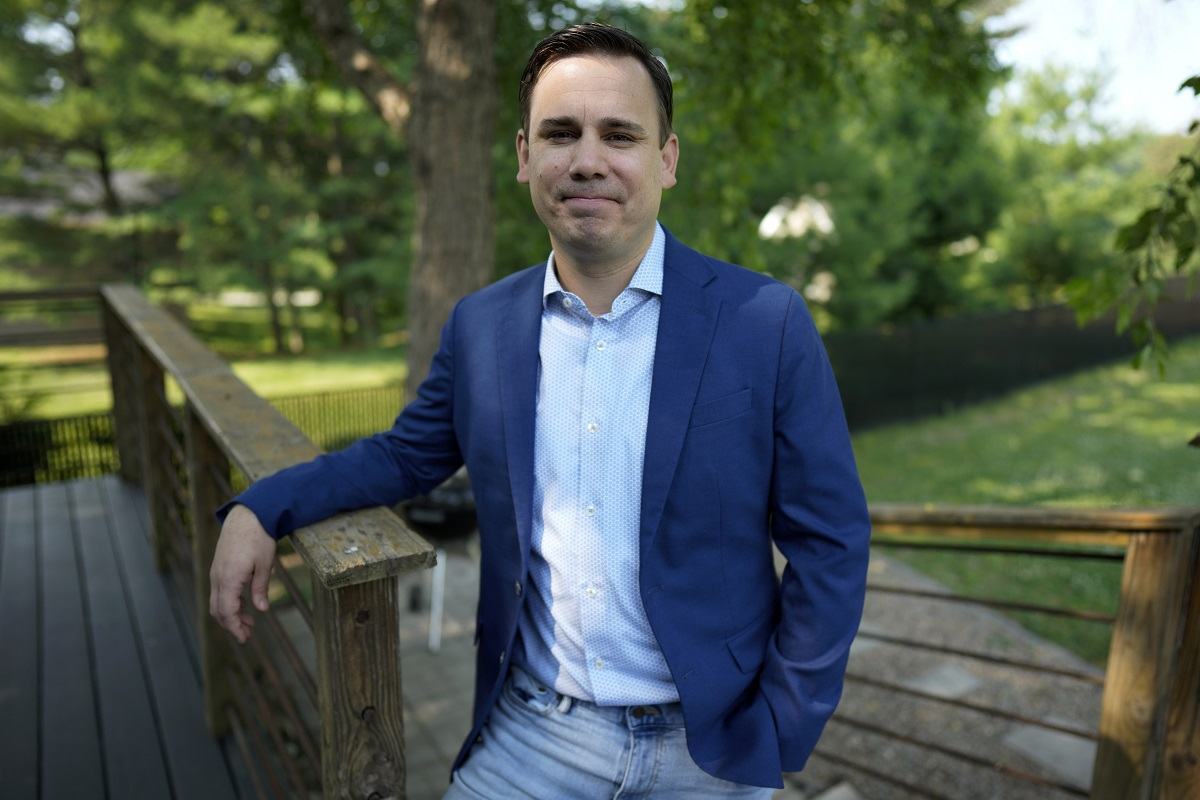An Iowa Meteorologist Started Talking about Climate Change on Newscasts. Then Came the Harassment

KCCI-TV chief meteorologist Chris Gloninger stands outside his home, Tuesday, June 27, 2023, in West Des Moines, Iowa.
14:36 JST, July 9, 2023
DES MOINES, Iowa (AP) — The harassment started to intensify as TV meteorologist Chris Gloninger did more reporting on climate change during local newscasts — outraged emails and even a threat to show up at his house.
Gloninger said he had been recruited, in part, to “shake things up” at the Iowa station where he worked, but backlash was building. The man who sent him a series of threatening emails was charged with third-degree harassment. The Des Moines station asked him to dial back his coverage, facing what he called an understandable pressure to maintain ratings.
“I started just connecting the dots between extreme weather and climate change, and then the volume of pushback started to increase quite dramatically,” he said in an interview with The Associated Press.
So, on June 21, he announced that he was leaving KCCI-TV — and his 18-year career in broadcast journalism altogether.
Gloninger’s experience is all too common among meteorologists across the country who are encountering reactions from viewers as they tie climate change to extreme temperatures, blizzards, tornadoes and floods in their local weather reports. For on-air meteorologists, the anti-science trend that has emerged in recent years compounds a deepening skepticism of the news media.
Many meteorologists say it’s a reflection of a more hostile political landscape that has also affected workers in a variety of jobs previously seen as nonpartisan, including librarians, school board officials and election workers.
For several years now, Gloninger said, “beliefs are amplified more than truth and evidence-based science. And that is not a good situation to be in as a nation.”
Gloninger’s announcement sent reverberations through a national conference of broadcast meteorologists in Phoenix, where many shared their own horror stories, recalled Brad Colman, president of the American Meteorological Society.
“They say, ‘You should have seen this note.’ And they try to take it with a smile, a lighthearted laugh,” Colman said. “But some of them are really scary.”
Meteorologists have long been subjected to abuse, but that has intensified in recent years, said Sean Sublette, a former TV meteorologist and now the chief meteorologist for the Richmond Times-Dispatch.
“More than once, I’ve had people call me names or tell me I’m stupid or these kinds of harassing type things simply for sharing information that they didn’t want to hear,” he said.
A decade ago, far fewer TV meteorologists were talking about climate change on air, although they wanted to do so, said Edward Maibach, the director of the Center for Climate Change Communication at George Mason University.
The Weather Channel gave its first climate reporter, scientist Heidi Cullen, a dedicated show in 2006. She faced bitter and sexist resistance from some viewers, including conservative leaders, as she challenged other TV forecasters to address global warming in their reporting.
Climate Matters, a National Science Foundation-funded project, piloted in 2010 and fully launched in 2012 to support reporting on climate change by providing data analysis, graphics and other reporting materials.
Now TV meteorologists across the country report on climate change, though Maibach said they don’t always use those words. It is increasingly common to at least show its effects, he said, like highlighting the trend of more days in a year hitting temperatures above 90 degrees (32 degrees Celsius).
Even if that kind of reporting resonates with most people, the criticism can be the loudest.
“If you stop reporting on relevant and important facts about what’s going on in your community because you’re hearing from the one out of 10, it means you are not serving the other nine out of 10,” Maibach said.
Some meteorologists have seen public interest in climate change grow even in largely red states as flooding, drought and other severe weather has ravaged farmland and homes. Jessica Hafner, chief meteorologist at Columbia, Missouri’s KMIZ-TV, said that with the exception of a few hecklers, she’s seen people respond well to data-based reporting because they want to know what’s going on around them.
Meteorologist Matt Serwe, who used to work in Nebraska, said the livelihoods of farmers who live there depend on the weather, so they take climate change seriously.
“You want to know how you can best succeed with these conditions,” he said. “Because at that point, it’s survival.”
It’s not just a problem in the United States. Meteorologists in Spain, France, Australia and the U.K. also have been subjected to complaints and harassment, said Jennie King, the London-based head of climate research and policy at the Institute for Strategic Dialogue.
Some meteorologists don’t see harassment as a direct result of their reporting on climate change; it’s a pervasive issue in the industry and targets some more than others. TV reporters are more likely than reporters in other mediums to say they have been harassed or threatened, according to Pew Research Center polling in 2022.
The gaps between Republicans’ and Democrats’ confidence in both the scientific community and the news media have been the widest in nearly five decades of polling by the General Society Survey, a long-standing trends survey conducted by NORC at the University of Chicago. But confidence in both declined across the aisle last year.
“Science is under attack in this country,” said Chitra Kumar, managing director of Climate and Energy at the Union of Concerned Scientists. “It’s this larger trend. It’s really unacceptable from our perspective that anyone should have to fear for their lives for merely stating the facts.”
Gloninger, 38, is moving back to Boston to care for aging parents, but he says he’s leaving Des Moines having realized that a small percentage of people who reject climate change make up an overwhelming percentage of the negative comments he has gotten.
“I know that now with the feedback that I’ve received after the fact, with hundreds of emails, dozens of handwritten letters,” he said of messages that have come from all over the state. KCCI-TV didn’t respond to request for comment.
“This incident is not representative of what Iowans are and what they believe,” Gloninger added. “At the end of the day, the people have been incredibly supportive — not just of me, but of the efforts that my station has made in covering climate.”
Top Articles in News Services
-

Survey Shows False Election Info Perceived as True
-

Prudential Life Expected to Face Inspection over Fraud
-

Hong Kong Ex-Publisher Jimmy Lai’s Sentence Raises International Outcry as China Defends It
-

Japan’s Nikkei Stock Average Touches 58,000 as Yen, Jgbs Rally on Election Fallout (UPDATE 1)
-

Japan’s Nikkei Stock Average Falls as US-Iran Tensions Unsettle Investors (UPDATE 1)
JN ACCESS RANKING
-

Japan PM Takaichi’s Cabinet Resigns en Masse
-

Japan Institute to Use Domestic Commercial Optical Lattice Clock to Set Japan Standard Time
-

Israeli Ambassador to Japan Speaks about Japan’s Role in the Reconstruction of Gaza
-

Man Infected with Measles Reportedly Dined at Restaurant in Tokyo Station
-

Videos Plagiarized, Reposted with False Subtitles Claiming ‘Ryukyu Belongs to China’; Anti-China False Information Also Posted in Japan























